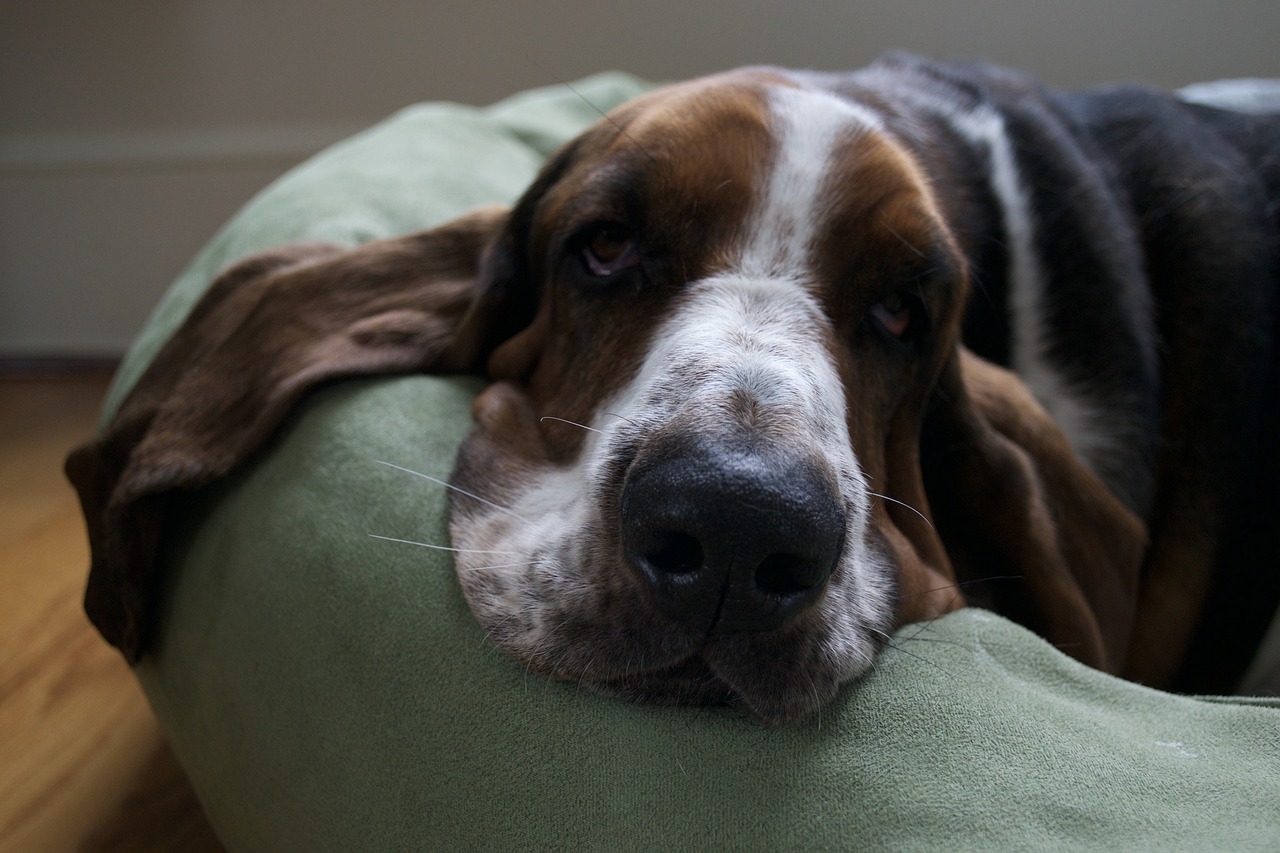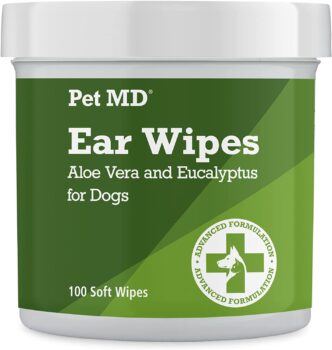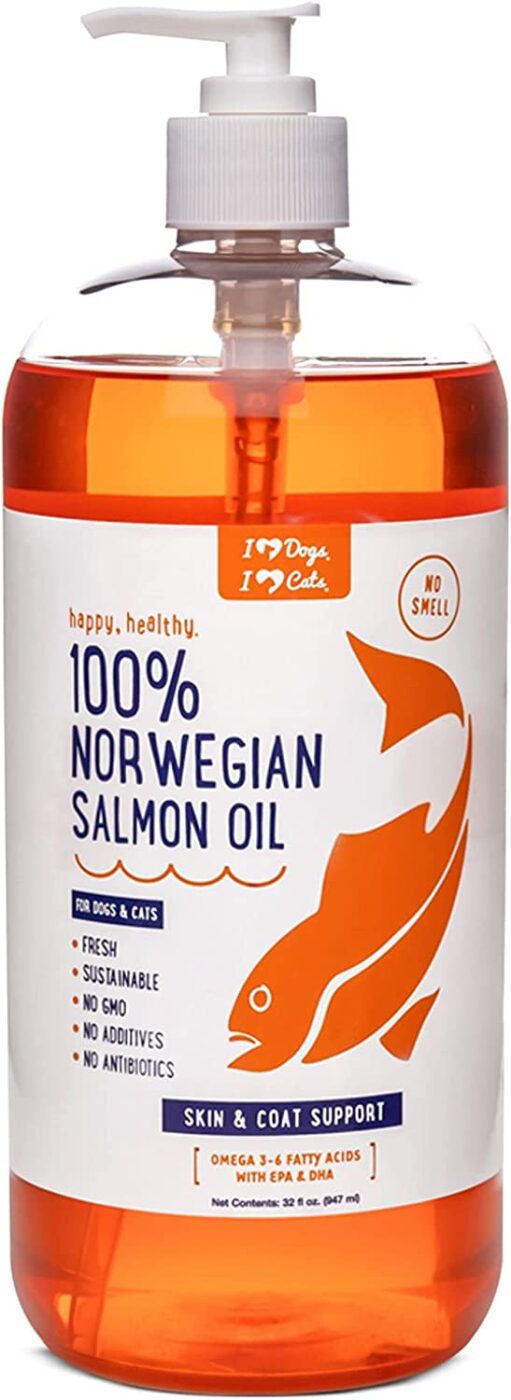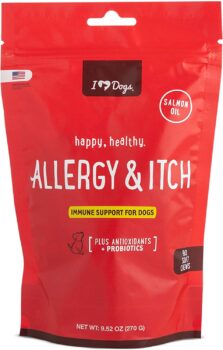Basset Hounds, renowned for their droopy ears and endearing expressions, are susceptible to ear infections due to their distinctive physiology. However, with appropriate preventive measures and treatment options, you can ensure your Basset Hound stays healthy and happy. Here are 11 ways to treat and prevent ear infections in Basset Hounds, including the benefits of incorporating Omega-3 into their diet.
iHeartDogs is reader supported. Some of the links below may be paid affiliate links, where we receive a small commission on a product at no additional cost to you.
1. Regular Ear Cleaning
Ear cleaning is a crucial aspect of ear infection prevention. Ensure to clean your Basset Hound’s ears once a week using a vet-approved solution. This helps to remove excess wax and prevent bacterial growth, thus reducing the risk of ear infections.
Our favorite ear cleaner is these PetMD brand ear wipes on Amazon.
2. Dry Ears After Swimming or Bathing
Due to their long, floppy ears, Basset Hounds’ inner ear can remain damp after swimming or bathing, leading to a potential breeding ground for bacteria. Ensure to thoroughly dry your pet’s ears after any water activity to prevent infections.
3. Regular Vet Check-ups
Routine veterinary examinations can identify early signs of an ear infection. If detected early, treatment is usually straightforward, so regular check-ups are critical for the health of your Basset Hound.
4. Use of Prescription Medication
If an infection is diagnosed, the vet will likely prescribe antibiotics, antifungals, or steroid-based medication to control the infection and inflammation. It’s crucial to complete the medication course to avoid reinfection.
5. Dietary Changes
Certain foods may exacerbate allergies, leading to inflammation and subsequently ear infections. Consult with your vet to determine if your dog might benefit from a change in diet.
6. Incorporate Omega-3 Fatty Acids in Diet
Omega-3 fatty acids have been shown to boost the immune system and reduce inflammation, both crucial for fighting allergies that can lead to ear infections. They can be found in fish oil supplements or specific dog foods.
We’re fans of this Norwegian salmon oil on Amazon. It’s a bright orangish-pink color and has no fishy smell at all due to it’s ultra high purity.
7. Avoid Allergens
Certain substances can trigger allergies in Basset Hounds, leading to ear infections. These could be environmental factors like pollen or specific types of food. Regularly monitor your dog for allergic reactions, and aim to identify and eliminate these triggers.
A few good supplements to help your dog’s allergies are apple cider vinegar, quercetin, and colostrum, all of which are found in many natural allergy supplements like this one.
8. Immunotherapy
If allergies are causing persistent ear infections, immunotherapy could be an effective solution. It involves exposing the dog to small amounts of the allergen over time, which helps the dog develop immunity.
9. Surgery
In severe cases, surgery might be necessary to allow better ventilation in the dog’s ear canal. This procedure, however, is usually reserved for chronic or recurrent infections.
10. Keep a Healthy Weight
Basset Hounds are prone to obesity, which can exacerbate ear problems. Maintain a balanced diet and regular exercise routine to keep your pet in optimal health.
11. Use Dog-specific Ear Care Products
Never use human ear care products on your dog as they could potentially cause harm. Always opt for vet-approved, dog-specific products for cleaning and care.
Frequently Asked Questions (FAQs)
- Why are Basset Hounds prone to ear infections? Their long, droopy ears do not allow for much air circulation, creating a moist environment where bacteria can thrive, leading to ear infections.
- What are the signs of an ear infection in my Basset Hound? Watch for redness, swelling, discharge, foul odor, and excessive scratching or shaking of the head.
- How often should I clean my Basset Hound’s ears? As a general rule, cleaning once a week is recommended. However, your vet might suggest a different frequency depending on your dog’s health.
- Can diet affect my Basset Hound’s ear health? Yes. Certain foods can trigger allergies that can lead to ear infections. Additionally, incorporating Omega-3 fatty acids in your dog’s diet can boost the immune system and reduce inflammation.
- Are ear infections in Basset Hounds serious? If left untreated, they can lead to chronic issues, including hearing loss. Therefore, early detection and treatment are essential.
- Can I use human ear care products to clean my Basset Hound’s ears? No. Always use vet-approved, dog-specific products for cleaning and care.
- How can Omega-3 fatty acids help my Basset Hound? Omega-3 fatty acids boost the immune system and reduce inflammation, which can prevent allergies and subsequently ear infections.
- What types of exercise are suitable for my Basset Hound? Low-impact exercises like walking or swimming are excellent for maintaining a healthy weight without putting too much stress on their short legs.
- Can ear infections in Basset Hounds be cured permanently? While there’s no permanent cure due to their physiology, regular cleaning, dietary changes, and other preventive measures can significantly reduce the frequency of infections.
- How can I tell if my Basset Hound is allergic to something? Common signs of allergies include excessive itching, redness, swelling, and digestive issues. If you notice these symptoms, consult with your vet.
In conclusion, though Basset Hounds are prone to ear infections, numerous methods exist to treat and prevent them. Maintaining a consistent ear care routine, incorporating Omega-3 fatty acids into your dog’s diet, and regular vet check-ups can ensure your Basset Hound enjoys a happy, infection-free life.




 Toledo, United States.
Toledo, United States.